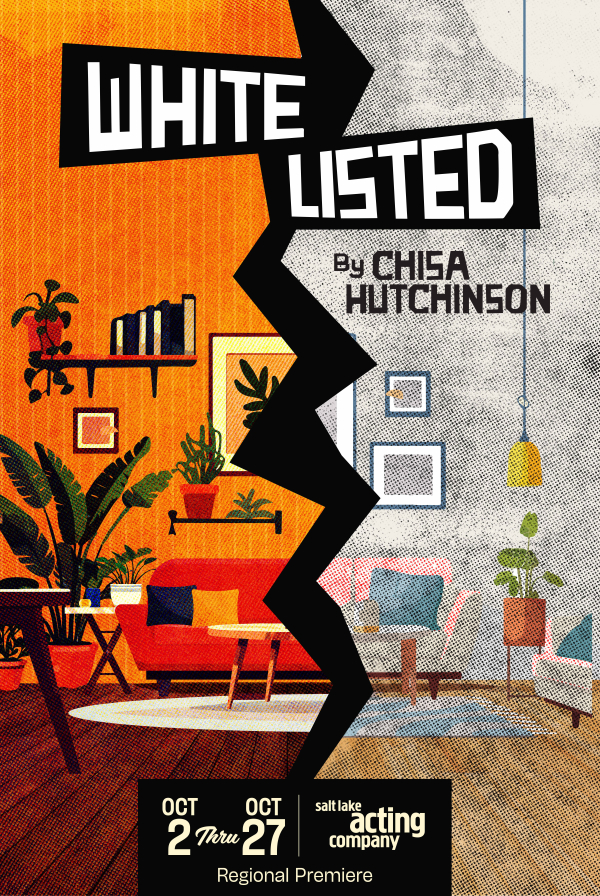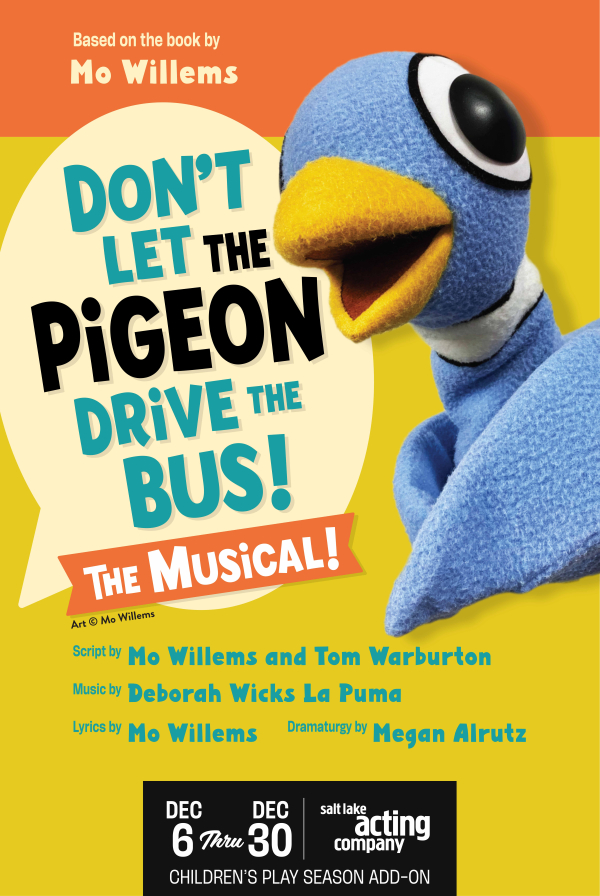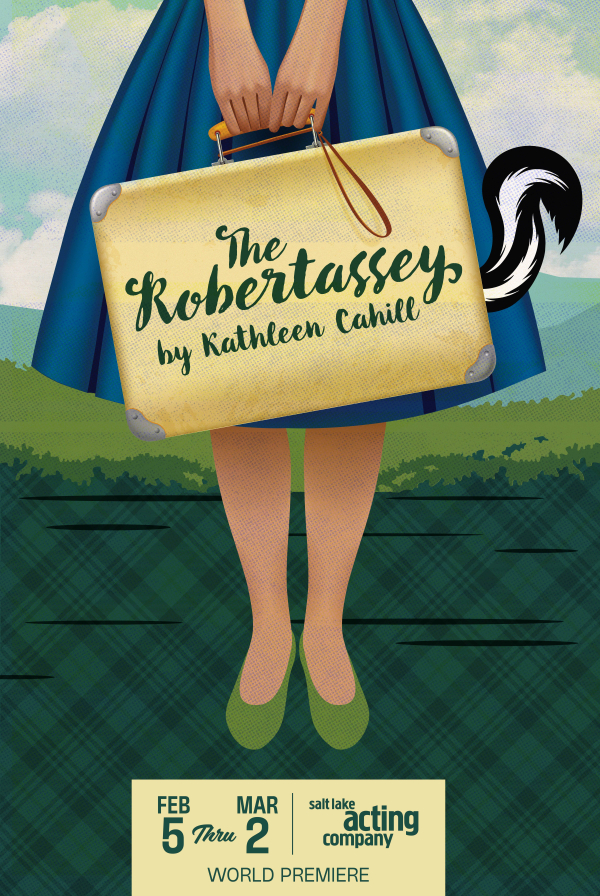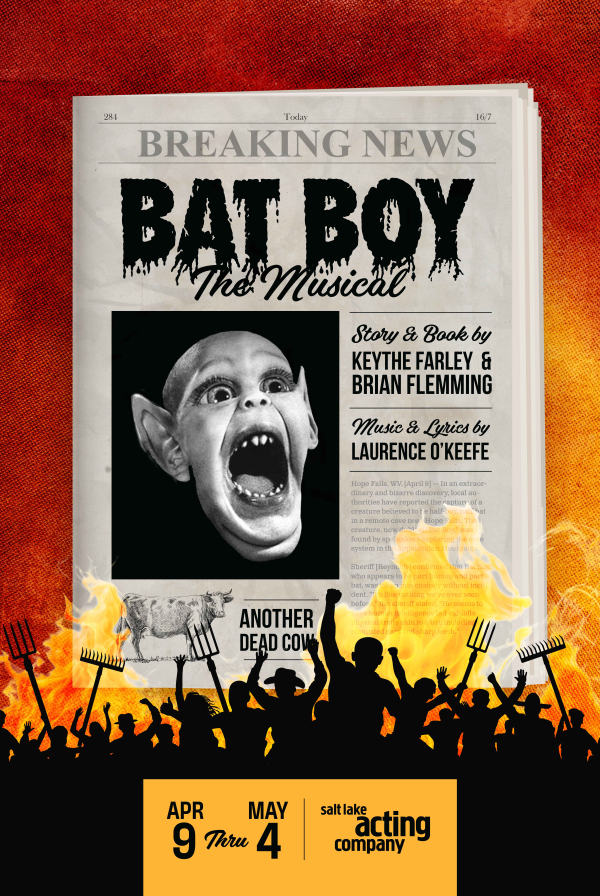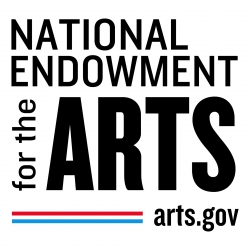Salt Lake Acting Company: Harbur Gate
A chat with the playwright, director and select cast for SLAC's latest production.
After an amazing first half to their 2016-2017 season with Bull Shark Attack, Winter, and Diary of a Worm, a Spider, and a Fly, Salt Lake Acting Company kicks off the second half with the powerful play Harbur Gate. The production dives into three stories of women veterans, inspired in part by news stories and documentaries. Today we'll be chatting with director Tamilla Woodard, playwright Kathleen Cahill and actors Ariana Broumas Farber and Topher Rasmussen about the show heading into tonight's opening performance.
Gavin: Hey everybody! First thing, tell us a bit about yourselves.
Tamilla: Hi, I'm Tamilla and I’m directing Harbur Gate.
Kathleen: I’m Kathleen Cahill. I’m a playwright.
Ariana: I am a veteran, a student, a mom and an actress!
Topher: I studied theatre performance at UVU. I have a deep love for Salt Lake City and I am constantly blown away by the music, art, film and theater that happen here. I am a curious theater-maker interested in new forms and methods. I love collaboration, conversation and fostering an empathetic artistic community
dav.d PhotographyCassandra Stokes-Wylie, Natalia Noble
What have all of you been doing in theater over the past year?
Topher: My 2016 started out with a run of Sackerson's The Worst Thing I've Ever Done (six short plays in a box, one actor and one audience member at a time). SLACLab followed, where I worked on Kate Tarker's Laura and the Sea. After auditioning for Harbur Gate, I was invited to participate in a workshop/reading of the play at the Lark in NYC. I had a riotous time on the summer tour with Grassroots Shakespeare Company, performing Twelfth Night and Antony and Cleppatra in parks all over Utah from Ogden to Moab. The Great Salt Lake Fringe Festival was an equally exhausting and enriching experience, from remounts of Worst and Antony to performing in the first play I've written, Hamlet and Ophelia Go Swimming. Halloween brought The Revenger's Tragedy with Grassroots. I wrapped up the year with my first go at producing when I brought Riot Act's Poor Bastard to CUAC.
Ariana: I've been acting in the plays Picnic and Elizaveta BAM.
Kathleen: I’ve been working on Harbur Gate and on another play called Silent Dancer, which is set in 1921.
Tamilla: More things than you probably want to put into print, but once I start listing them, it's hard to leave off mention of the projects I’ve had the absolute fortune of directing and developing this year, because they have been so socially conscious, uplifting and challenging the status quo work like Kathleen's Harbur Gate. In fact, the development of Harbur Gate was a big part [of] this year. I premiered the immersive street performance Broken City: Wall Street created by my company PopUP Theatrics. I premiered an incredible play by Melisa Tien about a girls soccer team in Cameroon called Yellow Card, Red Card at AAMDA. A sumptuous play about Queen Hatshepsut and women and power called Fit for a Queen by Betty Shamieh at Classical Theatre of Harlem. I worked on the development of a project about Mildred and Richard Loving that will premier this spring, called Loving and Loving (by Beto O’Byrne). I began development on a dark and funny participatory theater piece about immigration that will take the form of a live game show, co-created with Leila Buck. I’m the artistic director of an initiative called Five Boroughs/One City at the Working Theater in NYC, and directed the first of our five commissioned plays created for and inspired by conversations with everyday folks living and working in specific neighborhoods in New York's five boroughs. It's called The Block by Dan Hoyle, and supported the continued development of the other four which will premiere over the next three years. I also wrapped my final year as part of the Women's Project Theatre Lab. That’s my 2016.
Kathleen, how did you end up with a commission from the National New Play Network?
Kathleen: I worked with the National New Play Network on a play called Charm, so they knew about my work. I sent them a proposal which they then commissioned.
How did the concept for Harbur Gate come about?
Kathleen: I saw a film at Sundance a few years ago called The Invisible War about military sexual trauma. I was deeply affected by it, probably more than I realized at the time. Then I started hearing about how our armed forces were going to become “gender neutral” in 2016, which meant that women would go into combat. Of course, they already were going into combat, but it was “off the record.” And then one afternoon, I was sitting in my kitchen listening to NPR, a show about a traveling art exhibit about art and war. And they described a mysterious painting called “Veteran In A New Field” by Winslow Homer. They spoke of its metaphoric qualities, and the title itself grabbed my attention—coupled with the idea of women in combat, being warriors and veterans of war; they were in a “new field.” There’s nothing like “seeing” a painting on the radio by the way. It becomes like a visiting spirit. I knew that after the travelling art exhibit, the painting would return to the Metropolitan Museum of Art in NYC. When I was in New York, I made a point of seeing it. There it was, calmly working its magic. Of course, by then, I was deep into the play. The main inspiration of which was my experience of the Military Sexual Trauma support group, and the LGBTQ support group at the VA. Those were life-changing experiences. I also interviewed many female veterans.
Knowing the kind of subject matter you're touching, what kind of challenge was it to find the right voices for these characters that would tell this story properly?
Kathleen: It wasn’t that hard. I listened very closely to the veterans I met, and I was deeply affected by them. I guess you could say their voices haunted me and their experiences penetrated me to the core.
Tamilla, what were your first impressions of the play when you read it, and what made you want to direct it?
Tamilla: Oh my gosh, I loved that Kathleen was using different tones and storytelling methods to get at these three related experiences. I loved the ghost story-ness of the second play. I loved the camp of the first play, and I was very intrigued by the mystery man in the last play. Those were my initial impressions. I was keen to figure out the unifying elements and overlaps with Kathleen. And I think the work of the last few months has done exactly that.
What kind of challenge has it been for you fleshing out this particular production?
Tamilla: It's been all opportunity. The challenge is just in calling ourselves fully and courageously to the work at hand. Taking the conversations we had our first week in rehearsal with veterans into the room with us and keeping honest and open to their experiences. And digging deeper each day.
As director, what's your experience been like working with the cast and crew for this play?
Tamilla: Awesome! These people are so smart. So open-hearted. Our cast is just gangbusters, and I can't wait for you to see the depth and specificity of their work. Our design team has created a wow factor world and our producers keep saying "Yes, AND?" It's theater heaven!
Ariana and Topher, what did you first think of it when you read and auditioned for the play?
Topher: I was lucky to be introduced to Harbur Gate at SLACLab in 2015. I was thrilled and intimidated by the opportunity to play Russo, and impressed by the dynamic, fast-paced writing. It's beautiful, fearless and unflinching. Despite the heavy subject matter, it manages to be playful and very funny.
Ariana: I thought the role was challenging, and I was excited about the prospect of acting in a role about my beloved Marine Corps.
What's it been like for each of you to find your characters?
Topher: Russo is a super-motivated marine. In preparing for this role, I pushed myself physically, explored things like resilience and fearlessness, and confronted my limits to seek the mindset and attitude of someone who loves being a Marine.
dav.d PhotographyTopher Rasmussen, Cassandra Stokes-Wylie
What's your experience been like interacting with each other and bringing this play to life?
Topher: Ariana has been an invaluable, endless resource of legit Marine behaviors and philosophies. Her PT sessions were intense and unifying and gave us a taste of the dedication and motivation built into military life. Tamilla has guided us and pushed us further than we bought we could go, and in our way, we've become a tight-knit ensemble of soldiers.
Ariana: Really great, the other actors are so generous and the process has been really humbling as we got to interview veterans and learn about their personal experiences with their respective services and in some cases, their personal trauma.
Kathleen: Profoundly moving and wonderful. Everyone has given their all to this project.
What are everyone's thoughts going into opening night?
Ariana: My thoughts are that these stories are very deep and meaningful and represent several different populations of veterans. For that reason, I want to be as honest as possible in my portrayal of my character. Hopefully, the conversations that are started as a result of this play will have a meaning full effect on attitudes toward MST in the military and civilian spheres—even if it is just in some small way. I also want to let anyone who has suffered from MST known that we want to recognize that their stories matter. It's just a very small way of saying it, but for the victims who we have discussed the play with, it makes a huge difference to them in their lives, that we have listened to their stories and we want to start a conversation about them.
Tamilla: Can't wait. We’ll be so ready for that audience.
Kathleen: It’s thrilling. I started thinking about this project in 2013, so this opening night has been a long time coming. I hope the veterans who see it feel that it accurately represents and honors them.
Topher: I cannot wait to feel the energy that an audience will bring to this play. There is so much nuance, so much meaning in the work everyone has put in, and I can't wait for people to see the incredible things this cast is doing. I can't wait for the design, the projections, the sound—it will be an incredible experience.
What kind of impact do you hope Harbur Gate has on the audience?
Kathleen: The novelist E.L. Doctorow said that one of the purposes of art was to “distribute the suffering.” We all suffer on one level or another, and life is difficult. But if we can share the truth of our lives, if we can empathetize with each other, even a little, it makes a difference. I hope Harbur Gate is an emotional experience which creates a “new field” of empathy and understanding.
Tamilla: I hope it creates a space of empathy and exposes nonmilitary folks to some of the realities of serving this country. I hope it honors the people who shared their experiences with us and opens a road for dialogue, compassion and support. I hope it makes you laugh out loud. I hope you can't get these characters out of your head the next day. I hope you will come back to see it with friends.
Topher: I hope this play will be the starting point for some challenging conversations. I hope the love we have put into this show comes across to every veteran who sits in those seats. I hope people will join us in bravely confronting the difficult issues inherent in military life, and allow us to feel empathy for veterans and soldiers of all kinds and with all experiences.
What can we expect from all of you over the rest of the year?
Topher: I'm working closely with Avrec Art House on several projects. An immersive project or two are in development. I'm lucky to have amazing friends that constantly workshop and develop scripts. I'll definitely be doing something at the GSL Fringe. I'm not sure exactly what this year will look like, but I'll continue to push myself, learn new things and find different ways to participate in theater.
Kathleen: I’m working on Silent Dancer in the Salt Lake Acting Company Lab in February. It’s another project I’ve been working on for a couple of years. Also, Harbur Gate will be produced in Chicago next year. I have other projects in mind, but I feel it’s bad luck to talk about them before they exist. I’m superstitious that way.
Tamilla: I’ve starting a project called Liar. in residency at The Women’s Project Theatre and we’ll be continuing developing and researching that over the next year. In fact, we just launched a country-wide anonymous survey about truth and lies. Would love for your readers to take it, just go to this link. Meanwhile, I’m committed to doing more theater that challenges people to look closely and empathetically at the world around them, and the impact of our actions as humans beings to one another. If you’re in New York, you can find what I'm up to on my site and my company's site.





